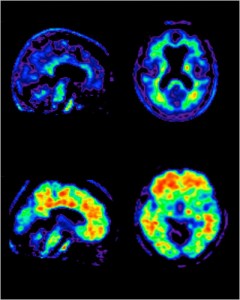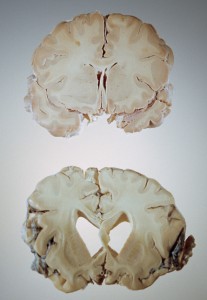
Top, images from the brain of a cognitively normal volunteer; bottom, results from an Alzheimer's patient. Plaque buildup is shown in red.
computer program that uses brain scans to spot Alzheimer’s Disease early is being tested by the NHS.
The new method compares the patient’s brain to a database of 1,200 existing images of brains known to be affected by the degenerative brain condition.
This collection of images is thought to be the largest of its kind in the world.
The test, which was developed at Maudsley Hospital and Kings College London, delivers results that are 85 per cent accurate in just 24 hours.
Curious? Continue reading
Source: The Daily Mail
Researchers rethink the role of amyloid in causing Alzheimer’

Differences in a healthy brain (top) and a diseased one (bottom) clearly show the damage wrought by Alzheimer’s. Credit: © Maggie Steber/National Geographic Society, Corbis
The polite term for what Alzheimer’s disease does to the brain is “neurodegeneration.”
In reality, it’s more like violent, indiscriminate devastation. Alzheimer’s scrambles communication channels, incites massive inflammation and demolishes entire brain regions as once plump cells shrivel and die, burying memories in the wreckage. As the attack intensifies, Alzheimer’s gradually strips away a person’s mind, and ultimately the cognitive abilities that permit a conversation with a loved one, a smile or a taste of food.
A couple of decades ago, some researchers thought they knew the root cause of this brain invasion?—?dangerous buildups of a protein called amyloid-beta. Get rid of these big, sticky globs and cure the disease, the reasoning went. But in recent years, a deeper understanding of the disease, along with a few disappointing clinical trials, has challenged long-held assumptions and forced a reevaluation of this strategy. [continue reading…]

Photo credit: Sarah Day
esults from a new study contribute to growing evidence that if one of your parents has Alzheimer’s disease, the chances of inheriting it from your mother are higher than from your father. The study is published in the March 1, 2011, print issue of Neurology®, the medical journal of the
American Academy of Neurology.
“It is estimated that people who have first-degree relatives with Alzheimer’s disease are four to 10 times more likely to develop the disease themselves compared to people with no family history,” said study author Robyn Honea, DPhil, of the University of Kansas School of Medicine in Kansas City.
For the study, 53 dementia-free people age 60 and over were followed for two years. Eleven participants reported having a mother with Alzheimer’s disease, 10 had a father with Alzheimer’s disease and 32 had no history of the disease in their family. The groups were given brain scans and cognitive tests throughout the study.
The researchers found that people with a mother who had Alzheimer’s disease had twice as much gray matter shrinkage as the groups who had a father or no parent with Alzheimer’s disease. In addition, those who had a mother with Alzheimer’s disease had about one and a half times more whole brain shrinkage per year compared to those who had a father with the disease. Shrinking of the brain, or brain atrophy, occurs in Alzheimer’s disease. [continue reading…]
Published: December 17, 2010
Since there is no treatment, doctors wonder if they should tell people, years earlier, that they have the disease, or a good chance of getting it.
To a casual observer, the articulate and groomed Ms. Popkin seems perfectly fine. She is in the vanguard of a new generation of Alzheimer’s patients, given a diagnosis after tests found signs of the disease years before actual dementia sets in.
But the new diagnostic tests are leading to a moral dilemma. Since there is no treatment for Alzheimer’s, is it a good thing to tell people, years earlier, that they have this progressive degenerative brain disease or have a good chance of getting it?
“I am grappling with that issue,” Dr. Rafii said. “I give them the diagnosis — we are getting pretty good at diagnosis now. But it’s challenging because what do we do then? Curious? Continue reading
Source: New York Times



